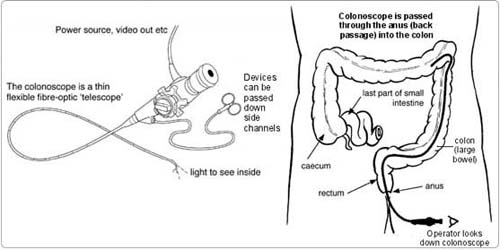What is it?
Your symptoms point to your lower bowel being the cause of your condition. So far the tests have not been too helpful. The best way of finding out now is to do a colonoscopy. It has not been suggested before because it is a bit complicated and needs a stay in hospital. Some patients, such as those who have had a polyp in the bowel, need to have repeated colonoscopies to check that the bowel is healthy.

The Operation
You will have a sedative injection or a short general anaesthetic. A colonoscopy means passing a flexible telescope (colonoscope) up the back passage into the lower bowel (colon) for a distance of about 5 feet (1.4 metres). Snippets of tissue can be taken, and polyps can be snared during the test. The bowel has to be cleaned out beforehand to give a clear view. You can plan to go home the evening of your colonoscopy, provided you have recovered from the examination.
Any Alternatives
Leaving things as they are is really too risky for you. The tests so far are not an answer in themselves. A colonoscopy at this stage is better than an operation. Other forms of scanning are not as useful as a colonoscopy at this stage.
Before the operation
Stop smoking and get your weight down if you are overweight. (See Healthy Living). If you know that you have problems with your blood pressure, your heart, or your lungs, ask your family doctor to check that these are under control. Check the hospital's advice about taking the pill or hormone replacement therapy (HRT). Check you have a relative or friend who can come with you to hospital and take you home. Bring all your tablets and medicines with you to hospital.
On the ward, you may be checked for past illnesses and may have special tests, ready for the operation. You will be asked to fill in an operation consent form. Many hospitals now run special preadmission clinics, where you visit for an hour or two, a few weeks or so before the operation for these checks. You will be asked to go on a special diet 3 days before the colonoscopy. You will be given instructions about medicines to clear out the bowel before the operation.
After - In Hospital
You may have slight tummy cramps as you get rid of air used during the examination. A general anaesthetic will make you slow, clumsy and forgetful for about 24 hours. Do not make important decisions, drive a car, use machinery, or even boil a kettle during that time. The discomfort of the operation can make it difficult to pass urine and empty the bladder. It is important that your bladder does not seize up completely. If you cannot get the urine flowing properly after 6 hours, contact the nurses or your doctor.
You may be given an appointment to visit the Surgical Out Patient Department for a check up about one month or so after you leave hospital. Some hospitals leave check-ups to the General Practitioner. The nurses will advise about sick notes, certificates etc. You are likely to feel back to normal within 24 hours of the operation. You should not drive, use machinery or make important decisions for 24 hours after the anaesthetic. This is because the drugs used can slow the brain down for a time. You can restart driving within 24 hours of the anaesthetic. The test should not interfere with sexual relations.
Possible Complications
Complications are rare and seldom serious. Making a split in the bowel wall is very rare. If you think that all is not well, please ask the nurses or doctors. There may be some bleeding for a day or two if a polyp has been snared.
Advanced Reproductive Technology
- In Vitro Fertilisation (IVF)
- Intracytoplasmic Sperm Injection (ICSI)
- Donor egg and embryo programs
- In Vitro Fertilisation (IVF)
- Pre-implantation genetic diagnosis (PGD)
- Surrogacy programs
Dental Videos





